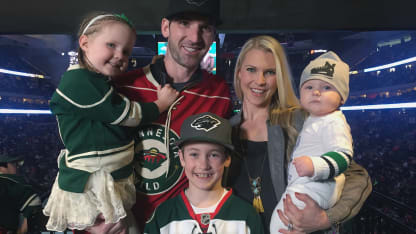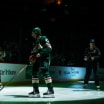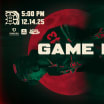It'll be five years this September since Harding received a diagnosis that would change his life and reroute the course of his career. Just before the start of Minnesota's 2012-13 season, Harding learned he had multiple sclerosis, a chronic disease that attacks the central nervous system and causes a variety of debilitating symptoms, like blurred vision, muscle spasms and weakness, that could make it vastly more challenging than it already is to be an NHL goaltender.
"That's one thing that a lot of people outside sports don't realize, how tough it is to actually be a professional hockey player," Harding said. "These guys give it everything that they have every night, and I respect everyone that's made it this far that's in the League, because you're getting in at all hours of the night and waking up at who knows what time to get into gear for a game, and you're always expected to be at your best.
"That could really wear on somebody, especially if they're not healthy."
Still, Harding persisted, earning a shutout victory on Jan. 20, 2013, his first game back after his diagnosis.
In warmups before Game 1 of the conference quarterfinals that year, starting goalie Niklas Backstrom injured himself, placing Harding between the pipes against the top-seeded Chicago Blackhawks, where he turned aside 35 shots in a 2-1 overtime loss.
The Wild lost that series, but Harding's five playoff starts and his perseverance earned him the Bill Masterton Memorial Trophy.
After the 2014-15 season, when dehydration due to his MS sent Harding to the hospital, he announced his retirement from the game he's loved since birth.
"When you take away something that somebody's been doing all their life, obviously it's gonna hurt," Harding said. "That's just a given with how much I actually loved the sport, I loved being around the guys, I loved being a part of the team. I loved competing."
As he adjusted to a new normal, Harding set out to find the positives in his situation. The NHL schedule often keeps players away from their families, and now, Harding could spend time with his young children. He could do things at his own pace and put his health first.
And he could coach, which he's done at Edina as an assistant to Hornets coach Curt Giles.
"The whole reason that I'm doing it right now is to kind of get my feet wet a little bit and see if it's something that I want to pursue later down the road or whenever that opportunity comes up," Harding said. "I've had a lot of great experiences with coaching. I love working with the kids. Right now, we'll kind of see where it goes, but I definitely love still being connected to the game of hockey because I just love everything to do with the sport."
Even after racking up 60 NHL wins and finishing his career with a .918 save percentage -- including a .933 save percentage in 29 games in his first full season post-diagnosis -- Harding is proudest of spending his whole NHL career with one team.
It's the team he still follows two years after his retirement, and above all else, the team that became his family.
"I miss the guys, I miss the locker room, I miss the family type atmosphere that the Wild, the organization creates from top to bottom," Harding said. "It's definitely a very special family to be a part of, and that's probably one of the proudest things of my career is just being with one organization and really feeling like that I'll always be a Minnesota Wild."


















